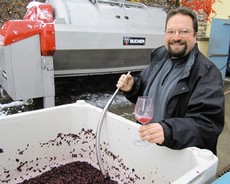What wines at Heron Hill Winery are gluten free?
First of all, I would like to cease this opportunity to wish you all a Happy New Year 2011! May this New Year be full of health and happiness!
After spending Christmas down on Long Island, under over a foot of snow, I got to spend the New Year Celebration with a few friends in a barn surrounded by vineyards just a slingshot away from Keuka Lake. Deep fried Turkey and Mulled wine paired very well together…
 Now, the vines are dormant, and Zac and Ethan are running wires for the new planting we did last spring. They also managed to do some cleaning and burning some piles of brush: pretty high flames! It is supposed to be a cold winter, so we will wait until February to get started on the pruning, to be done by early April, before bud break.
Now, the vines are dormant, and Zac and Ethan are running wires for the new planting we did last spring. They also managed to do some cleaning and burning some piles of brush: pretty high flames! It is supposed to be a cold winter, so we will wait until February to get started on the pruning, to be done by early April, before bud break.
In the cellar, we are monitoring a couple of fermentations about to end. I personally like slow fermentations on white wines to preserve the fruity aromas that developed during the fermentation. If the temperature rises too much, these aromas tend to dissipate. On the contrary, the red wines need higher temperature during fermentation in order to extract the tannins trapped in the skin and seeds. I like to ferment the white wines at around 60 degrees Fahrenheit and the reds can reach temperatures of over 90 degrees at the peak of the fermentation. Right now, the reds have all completed the primary fermentation (or alcoholic fermentation) and are now undergoing the secondary fermentation, also called Malo-Lactic Fermentation (MLF), which is the transformation of Malic Acid, naturally found in grapes and apples, into Lactic Acid, which is a softer acid. The MLF helps the mouth feel tremendously on the red wines. For the white wines, this process is not a necessity. Most winemakers prefer to keep the natural acidity in the white wines to preserve their freshness. At Heron Hill Winery, all the reds undergo MLF, but none of the whites do.
We recently received a question about gluten in wine. From the top of my head I couldn’t think of any additive used in winemaking that could contain gluten. Gluten is a big “storage molecule” (like starch) found mainly in wheat and wheat products, like pasta and bread.
At Heron Hill Winery, we only use a few additives, preferring to assist Nature instead of manipulating the wines too much. I checked the composition of the yeast nutrients we use to help the yeast during the fermentation, and there is no gluten in it, which makes sense because as I said gluten, like starch, is a big molecule that needs to be broken down into smaller pieces in order to be ingested by yeasts. Yeast nutrients contain small proteins and vitamins so the yeast can use the nutrients quickly and efficiently.
Close to bottling, we use some fining agent to clarify and stabilize the white wines. Again, there is no gluten in it. Furthermore, the fining agent is a big molecule (clay and/or protein), which reacts to the proteins in suspension in the wine, and once attached to each other and they precipitate to the bottom of the tank. Later, the wine is racked and filtered so these agglomerates are taken out of the wine.
So, to my knowledge, there is no gluten in our wines at Heron Hill Winery. Hope this answers our reader’s question!
Cheers!
